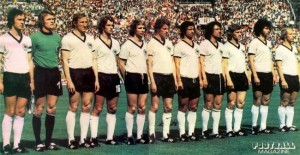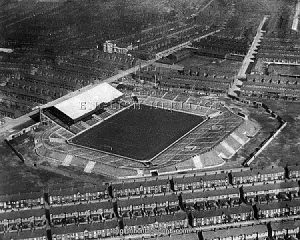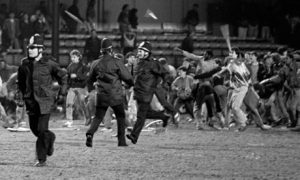Anthony Burgess and the beautiful game
-
Burgess Foundation
- 9th July 2014
-
category
- Blog Posts
Anthony Burgess visited West Germany in 1974 during the early part of that year’s World Cup. He did not visit any of the stadia, but appears characteristically to have watched a game from the restaurant of the Kempinski Hotel in West Berlin, which served ‘a World Cup cocktail — equal parts of curacao, vodka and orange juice — at 5½ Deutsche Mark a throw, or kick.’
His article on the tournament, ‘An Ancient Kickaround (Updated)’, was published in Time magazine on 8 July 1974. Burgess’s research for the piece is clearly somewhat limited, but is typically lively and engaging and contains a mixture of local colour (‘Frankfurt airport was a Brechtian fantasy of chauvinistic headgear and rosettes’) and speculative commentary on the meaning and importance of the game.
‘Soccer is traditionally crude, and attract roughs, drunks and roarers. It cannot be discussed in pubs without passion and obscenity. It is certainly not a gentleman’s game. Even its subtlety and skill have failed to recommend it … For those of us who are not gentlemen, the paradox of football delights and intrigues. Albert Camus played goal. Sir Frederick Ayer, the philosopher, is a fan, and there is a sense in which soccer is a fair subject for a logical positivist. It is, after all, a precise and yet various system of semiotics.’
In all his writing Burgess mentions attending a football match only once, in his autobiography Little Wilson and Big God (1987). His only memory of having been taken by his uncle, Jack Tollitt, to Maine Road to see Manchester City play in 1928 was the ‘passion and obscenity’ during discussion of the game that he mentions above. ‘[Jack Tollitt] incautiously said: “McCabe is the best centre-forward playing anywhere.” There was a derisory and even bitter response of fuck off, is he fuckin’ hell, what the fuck does this fucker think he fuckin’ knows about it? the answer being fuck all. I was now familiar with the word in all its declensions.’
Burgess renewed his interest in football in 1985, producing articles on the Heysel stadium collapse, reflecting on the particular kinds of violence associated with football crowds, and the dangers of mobs (‘Where there’s a mob, there’s no morality’, in the Daily Mail on 31 May 1985 and ‘When Soccer Fans Become Beasts’, in Newsday in May 1985); and again in 1989, following the Hillsborough disaster (‘Is It Worth It?’, May 1989). The latter piece is particularly interesting in its prediction of reform of football in England following the deaths in Sheffield, such as the need for all-seater stadia and the possibility of turning football into a kind of family entertainment; but also in its sombre and somewhat despairing conclusions about the debasement of contemporary culture:
‘The British are a violent people. Their history has been partly a chronicle of the subduing of violence. Ironically, games like association football were once considered a surrogate for the aggression of civil war or of colonisation of reputedly barbarous territories. We now see that this is not so. If the educated can achieve their catharses through listening to Beethoven or watching Hamlet, the proletariat can only purge themselves of their baser instincts through an entertainment that arouses group solidarities and unleashes bellicosity … For many thousands of Britons there is nothing more important than the Saturday yell of the crowd as it watches twenty-two men kicking a piece of leather about. There is something wrong with our culture if we have come to this.’
As Jim Clarke has noted, Anthony Burgess is often wrongly assumed to be a football fan based on a single truncated quotation from Inside Mister Enderby (1963). The character Walpole says to Enderby: ‘Today is Saturday. Five days shalt thou labour, as the Bible says. The seventh day is the Lord thy God’s. The sixth day is for football and spreading the word and punishing and suchlike.’ The line is usually truncated to end at ‘football’, but it does not really indicate an enthusiasm for the sport on Burgess’s part when taken in context.
Football appears once, briefly, in A Clockwork Orange (1962), with Alex describing what is in the newspaper: ‘The gazetta was the usual about […] footballers making everybody paralytic with fright by threatening to not play next Saturday if they did not get higher wages, naughty malchickiwicks as they were.’ Stuart Bolton points out that this may be an indirect reference to the striker Jimmy Greaves, who in 1961 had been sold by Chelsea to AC Milan and controversially refused to play three end-of -season friendlies for Chelsea unless he was paid more money. This caused great outrage in the press. While Burgess was a regular reader of the Telegraph during this period, completing the crossword daily, his wife Lynne took the Mirror: it may be that the sports pages were Burgess’s source for this story.
Burgess’s articles on football are in the collections of the Burgess Foundation, and are also at the National Football Museum in Manchester.





